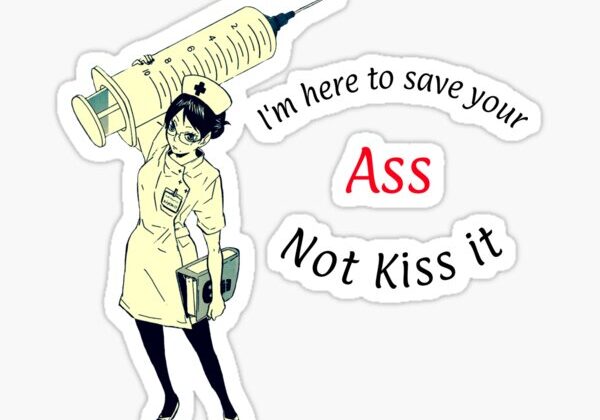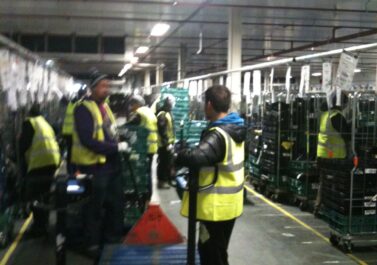Workers’ power during and beyond the lockdown – Interview with a NHS community midwife – End of June
Second in a series of interviews, we have written about the idea behind these interviews here:
Interview Series: Workers’ Power during the Lockdown
This interview reveals, amongst other things, the amount of unpaid overtime worked in the NHS during Covid, the transformation of ‘professional online forums’ into channels to discuss working conditions during the lockdown and, last but not least, the significance of informal care work for the wider capitalist work regime.
I am a community midwife, working out of an office in a team of seven – four midwives and two maternity care assistants, plus our boss. our actual clinical work is done in a room at GP surgeries.
How did Covid come up at work?
It came in with quite a lot of fear for us, especially at the beginning. Everyone was self-isolating and we were still going to work – that was odd. Management didn’t really acknowledge the fear people had. It was incongruent: everyone staying at home and us going to work, seeing fifteen women a day, expected to go into women’s houses.
I took my kids out of school one week before the offcial lockdown, because me and my friends thought the government was not doing what they were supposed to. There was already news from Italy and other countries. I think the public locked down before the government did. And our health trust didn’t do anything before the government did. There was even a bit of a time lag then. By the time the trust management did anything we had already been quite nervous for two, three weeks. There was no management advice before lockdown, no changes. I myself changed my work routine at the risk of getting in trouble. I am on various midwife Facebook groups and I knew that a lot of trusts were doing more than we were. And even our team was not doing as much about health and safety as other teams within our trust. The RCOG (Royal College of Obstetritians and Gygnocologists), who are the uber-advisors, suggested ways to safely see women less. They put a Covid strategy on their website, like, there were certain appointments you could do over the telephone, there were certan blood tests that you could combine. A reduced schedule that would not compromise women’s health too much. And our trust wasn’t doing that and neither was my team leader – but I was to a certain extent. If they ask me why I am doing certain things over the phone I will have to say that I was scared for my health. The RCOG guidelines could have been a national guideline, but the local trust said that there were not many local Covid19 cases, that’s why they didn’t advise to change the work routine. The measures taken varied extremely between trusts. I have colleagues in Hackney, in Cambridge and so on, and on the Facebook groups people were asking each other what each trust was doing, for example, are you doing telephone booking or 16-weeks phone appointments? The differences were stark, in particular compared to my team.
In terms of the hierarchy there is the team leader, above that is the matron of community. She has about 50 to 70 people under her, about seven to ten teams. Above her there is the head of midwifery, who manages the different departments: community, delivery suite, anti-natal clinic, post-natal. We felt that our team leader was pretty bad. If you applied stricter health and safety measures you were made to feel like you were being lazy. Colleagues from other teams were saying: “How can she make you do home visits at the moment, that’s crazy.” That was the majority opinion amongst the community midwives. We cross over at the weekends, we work at different bases, there are few managers around, you tend to have lunch together and it is a bit more chatty – that’s when we talk about things. In an email our matron was also juxtaposing our health versus the women’s health, as if we would be jeopardising the women’s health. Of course, if a woman would say on the phone that she is worried for her or the baby’s health I would be there like a shot. But routine visits? So much we do is routine stuff, like screening the healthy population.
Were there any efforts to coordinate certain changes to the work routine amongst midwives locally?
Informally, yes. We agreed amongst ourselves to do certain things, like the telephone triages. Some also wrote to the matron to ask why we were not following the RCOG guidelines.
And these national Facegroup groups are a bit more like the political wing of midwifery?
Not all of them are that political, it’s also about midwifery student support, with practical questions. But they are independent.
Did the character of these groups change?
Yes, they can be a bit wishy-washy, but they became more focused. Lots of people discussing what to do and what not to do in terms of health and safety. That was really useful, because you can see where people in different locations are at. You could compare what is happening in different trusts, which embolded you. Peaople were asking on the forum: “How do you deal with 16-weeks appointments in your trust?” and 50 people would reply. That was useful.
Was there a reaction to people changing their work routine?
They were cautious, they knew what we were doing, but turned a blind eye. Which is messy. They neither said that everyone can do 16-week telephone appointments nor did they say that you mustn’t. We do it, but we feel unsure about it. In terms of PPE I thought we have the adequate stuff in the community department. It’s different from working on Covid wards or other risk departments in the hospital. For me the main issue around PPE was time, the time it takes to change and clean. This was my other dispute really. You have 20 minutes to see each woman in normal life, and that is still the case. But in these 20 minutes you now also have to walk down two flights of stairs, change your PPE, wipe all surfaces and so on and then go back and let the next woman in. Everything takes literally twice as long. They should have given us more time for that, they should have changed to 30 minutes appointments. I kept bringing that up, but then created my own solutions. I would book a double appointment for every fifth women. Administratively I can do that. Normally you would do that for women who need an interpretor or with mental health issues or complex medical issues. I think other people did that, but it was more of an individual decision. Again, you felt a bit naughty, it would have been better if you had the backing from management for that.
There are bigger changes in the hospitals. Like partners cannot visit on post-natal wards. In the hospitals some people were shielding. There were some arguments about the question of who can and cannot shield. There are many older women in the job, but they are pretty dedicated and often rather go to work than take care of themselves. We had a couple of people dying, a porter died. There were not so many disputes between workers and management over health and safety. Work got a bit simplified in some ways. But then you also had stupid rules, like women in labour wearing masks. You are there with a sweating, puffing woman, touching her – I mean, if she has Covid you are going to get it.
Apart from this mask rule, why do you think that management kept things in limbo or turned a blind eye?
Management was not very pro-active. They had Covid meetings every day, face to face, but things were changing so fast, they did not keep up. Maybe they also had a different idea about risk, maybe they thought that things were actually not that dangerous. Perhaps because they are removed from the daily routine. A lot of meetings, but not much happening.
Did the official lockdown change anything?
It made it weirder for the women. Because it felt contradictory that they were still supposed to attend the midwifery appointments. Visiting us was the only thing they were doing and they knew that we ourselves would be visited by ten women a day. The baby might not have been seen by the baby’s own grandmother, but might have had visits from three different midwives, day after day.
What happened with the numbers of workers and the amount of work during lockdown?
We had more work, for example because of the cleaning. Then there were less workers. I normally finish at 4pm or 4:30pm. Now I would stay till 6pm to get the work done. Weekends we normally finish at about 2pm, I would finish at 4 or 5pm. If a colleague’s partner would have symptoms she would have to isolate herself for two weeks, also because there was no testing or track and trace. Loads more work because of people shielding or isolating. And more work, because even home visits took longer, with all the PPE and cleaning. During the peak of the lockdown I worked about a quarter again, unpaid. I felt that that was not acknowledged.
Was there any discussion about working unpaid overtime?
Naw, it’s his martyr NHS thing, a macho martyr thing.
Did they bring extra staff in?
No.
Did the relation between you and your co-workers change during that time?
Yes. Some of us became more intimate, also because of fear of death or getting seriously ill. We would get to know more about each others home life, too. We were the only people we were seeing during lockdown, we were keen to chat and make sense of things. It threw us into an intimacy. I also talked more to the GP nurses than before. And of course, we got all the freebies, everyone brought stuff for the NHS heroes.
Did the relationship with the women change?
Not much. I think it made us less tolerant with a certain type of woman who might be over-concerned with what seemed to us to be minor issues. We were working hard and became more irritable. But then there were women crying, because of increased anxiety and the fact that corona meant that they couldn’t get support from the grandparents. The cutting off of the women from their parents is a blow beyond belief. Grandparents are so important in the whole story. I had a lot of compassion for that. A lot of women gave birth alone, because the husband was alone with the older children. Awful things.
That must be a severe situation, if we see, for example, that black working class women are both more likely to be harmed by or actually die of corona, but also in childbirth.
The conditions during home visits were often tough. Overcrowded, no garden. Then the parents are too scared to let the kids out to play, so everyone is crammed in, kids off school. So many women with newborns at home, while the other kids are also locked in, in a two bedroom flat. Loads of places we go to are multiple families, one family a room. A lot of husbands are taxi drivers, they are at massive risk, sitting in a car with people.
Did the union play any role?
Naw, they are pretty wishy washy, to be honest. The Royal College of Midwives are half a union, half a professional association. They didn’t do anything. Nothing that I can remember anyway. They put out bulletins, but nothing that I could wave in front of management’s face and say: “Here you see, we can do 16-weeks appointments by telephone.” Or something like that. They played into the whole NHS heroes bullshit too much.
Did the hierarchy with the healthcare assistants change?
Only in the way that us midwives are better paid and our job is a bit more of a calling or a vocation. As much as I don’t like all the talk about ‘vocation’ from a political point of view, in communism I would still be a midwife. I like caring for women. In this way I am prepared to take that risk for other women. But to ask the assistants to risk their lives for shit pay, that is bad. They like the work, they like seeing the women better than the admin work. But I don’t think that they would come in if you said you can stay home paid. Forget the vocation thing, just look at their wages. Band 2 start on £18,000 a year, that increases to £19,300 after six years and Band 6, which is what midwives are on, start at £31,000.
The government introduced a NHS fee for migrants, but then later on, during the corona crisis decided to exempt migrant NHS workers from that fee. Do you think that happened due to pressure from below?
I didn’t see any local initiatives. The ‘Patients not Passports’ and ‘Docs not Cops’ initiatives did keep on going on that on a national level. It’s a campaign-y type of thing where we try to put pressure on trusts not to go along with the government thing in terms of migrant charging. The trust is who we are targetting, not primarily public opinion. That kept on going. But I think the whole thing was just embarasssing and awful and they had to take it back. First saying NHS heroes and then asking NHS workers to pay £200 or £600 to get healthcare. In a pandemic, to put financial or other barriers between possibly infected people and the health sector is nuts. You would try to remove all barriers.
Did co-workers talk about how their families are coping financially? If people lost jobs, had to take on new jobs?
The main thing was childcare, and the fact that all that is based on kids going to school. That was difficult for people. There is key workers’ school, but midwifery doesn’t go from 9 to 5. Key workers school increases the health risk to your family. So what do you do? Some people picked up lots more overtime, bank work at the weekends. But childcare was the main issue. People left older kids at home, but then felt guilty about it and worried. My two flat-mates lost their jobs in hospitality and found themselves without income overnight. I relied on them to do childcare. Other co-workers had their older children coming back from university and could rely on them. People had different strategies. But another reason why many of us stayed till six was because many of us were bloody bored by our children and partners at home. Home life became a topic and the question of social reproduction. People were supposed to work from home with their kids around and realised that that is damned difficult, if not impossible. Childcare is work. It revealed the role of the grandparents, and all the neighbourhood structures and stuff women have put in place, like play dates. All this is vital to go to work. This is normally invisible, the whole fucking house of cards is built on these informal relationships and if you take them away… everybody suddenly saw the unpaid work, because it was not done. It takes a village to raise a child, but the village was shut. You can’t put your kids in front of the telly for eight hours. There were these hilarious Twitter threads from home working mum’s about their child ‘co-workers’: “Today my co-worker smeared peanut butter all over themselves.” “I was surprised when I entered the canteen and found my co-worker had done a wee in their trousers”. And not just childcare, care in general is often organised informally, that all came to the fore. I think it’s interesting to see how society is built on these structures of social reproduction. And the crisis of the family form, like, being annoyed with your partners when you have to hang out at home.
Did you take part in mutual aid groups?
There are a few WhatsApp groups in the area. Mainly Muslim and Pakistani community, they were very organised and active. Some church groups. Our street had a mutual aid group. Wasn’t so mutual in the end, but good overall. In this area there were many posters, leaflets through doors and Facebook Groups. The local pub turned into a food bank. But it did not relate to the relationships at work, there was no workplace based mutual aid as such.
Did the easing of the lockdown in early July impact you at work?
No, PPE and rules stay the same.
Are there any changes that management wants to make permanent, changes that impact on your work?
This is very interesting and this is our worry about care really. We do slightly less care now to be honest, so the government or management could think that with less hands-on care, if there are no adverse outcome, the health of women and babies is not going down, that they might think that they can cut some services. The health visitors stopped working, they shut down their offices during lockdown. They only do phone calls, no visits at all. This has been a bit annoying, because we have been doing them. We would normally refer some babies or women to health visitors, but there were none. That’s another reason why we did more work. People say that the health visitors might have put themselves out of job by that.
How did that happen?
I don’t know, they are employed by the local authorities. I don’t know if that was across the country or just local. If the babies are not less well, that’s the health visitors job out of the window.
Were the women not complaining that you were not visiting them, just phoning?
Mostly not. Maybe a little bit. I think the results from the lockdown will be used to push through cuts.
How was the whole Covid situation discussed, the way the government reacted?
There was a lot of criticism of the government, of course. But then some co-workers also called the cops on people sitting in a park. ‘Can’t believe the government, can’t believe the public’ type of comments. Everybody thought that government should have locked down earlier. Some people liked the heroes thing, the clapping. All that sacrifice and war talk. But we all got a bit tired of it after a while.
Was there a discussion about ‘essential work’ on a wider social level? Who is doing the work?
Not really. The NHS is a bit myopic. We tend to think that the whole world is the NHS, because many friends and family also work in the NHS.
Do you think you come out of it stronger as a group?
I think stronger, because there was a sense of trust in each other. We have broken the rules together, and been through something together.
Any discussions about the NHS bail out?
No.
Any discussions about strikes abroad?
No.



